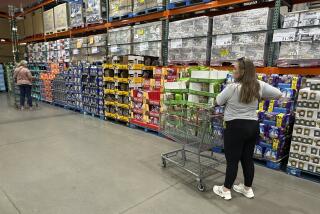Shoppers play it cool in January
- Share via
Consumer spending slowed to a crawl in January, with retail sales at major chains rising just 0.5% in what was by one measure the month’s worst performance in nearly 40 years, according to reports released Thursday.
Evidence of consumer caution came from both ends of the marketplace.
Discounter Wal-Mart Stores Inc. said shoppers held on tight to the gift cards they received over the holidays or used them to buy milk and bread rather than toys or iPods. High-end Saks Inc. said customers shifted more of their spending to “promotional events” -- making purchases when items were specially priced.
Wal-Mart’s sales were higher this January than last, though just barely, while Saks saw a 4.1% increase. Sales at Macy’s Inc. stores fell so much more than expected -- by 7.1% -- that the company slashed its quarterly profit forecast and also said that as part of a restructuring plan it would eliminate 2,300 jobs. Costco Wholesale Corp., on the other hand, recorded a 7% hike.
There were widely divergent numbers for individual chains but disappointment for the industry as a whole.
The International Council of Shopping Centers, which tallied 43 retail chains, said sales at stores open for at least one year were the worst since it started keeping track in 1969.
“Whether we have a recession or not, things have slowed,” said Michael Niemira, chief economist for the group.
Although January sales represent a small slice of the industry’s annual revenue, the results were disappointing after a downbeat holiday season. Looking ahead, the National Retail Federation said the slump would affect U.S. ports where products destined for shopping malls are unloaded.
“We’re going to see little increase in cargo on the docks,” said Jonathan Gold, the federation’s vice president for supply chain and customs policy. “Container traffic at the ports is a leading economic indicator because it reflects retailers’ expectations for sales.”
Industry analysts had believed that gift card redemptions would lift January sales. It turned out that many Americans weren’t window shopping because they were too worried about the economy and whether they would keep their jobs, said Jharonne Martis, Thomson Financial’s senior research analyst. And if you’re not shopping, you can’t redeem your gift card.
“They’re not even going out to peek,” said Martis, who called the January numbers “incredibly weak.”
“Consumers don’t have any confidence in the current economic situation.”
In January, furniture sellers and specialty stores took a beating. Department stores as a group slumped with a 5.7% sales drop. For chains that sell luxury goods, the slip was 2.2%. Nordstrom Inc.’s 6.6% drop was particularly harsh considering that analysts had expected a 0.7% decline.
Teen retailers handed in mixed results, with two Orange County chains making Thomson Financial’s “Biggest Misses” list.
Sales at Anaheim-based surfwear seller Pacific Sunwear of California Inc. fell 7.4%, instead of gaining 1.2% as Wall Street had expected. And trendy clothier Wet Seal Inc., based in Foothill Ranch, saw sales slip 5.7%, more than the 1.5% forecast.
San Francisco-based Gap Inc. beat estimates by slipping 2%, rather than the 6.5% drop that was expected.
In January, the main draw for shoppers was low prices, Martis said. “There were very steep discounts -- and definitely it is going to hurt profit margins.”
Niemira of the International Council of Shopping Centers agreed and said more profit warnings were likely.
“Going forward, we certainly are starting off in a much more risky retail and economic environment,” he said. “In that context, it would be prudent for companies to basically lower their guidance.” The experts didn’t anticipate a major flip in February numbers. And Martis of Thomson Financial said stores now had even more motivation to cut prices -- making room for goodies tied to Easter, a holiday that this year falls earlier than usual.
“Now they have even more pressure to get rid of all that inventory,” she said.
On Wall Street, retail stocks were generally higher. An index of 31 retailers in the Standard & Poor’s 500 jumped 3.7% despite the weak sales as investors focused on companies that beat expectations. Of the 36 companies monitored by Thomson Financial, 16 did better than expected.
--
More to Read
Inside the business of entertainment
The Wide Shot brings you news, analysis and insights on everything from streaming wars to production — and what it all means for the future.
You may occasionally receive promotional content from the Los Angeles Times.










